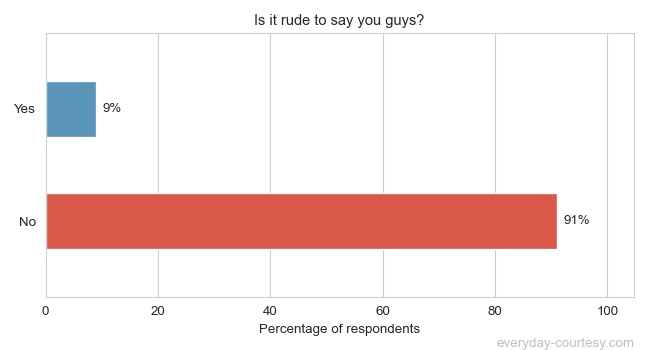Addressing groups the right way is always an issue, but it is unclear where the boundaries for correct speech lie when social norms are constantly changing.

A typical example of this is to use the term “you guys” for mixed-gender groups. To approach the topic, we asked mainly young people in the U.S. for their opinion about it.
Is It Rude to Say ‘You Guys’?
Our recent survey on whether it is appropriate to use the term “you guys” revealed that, among 103 Americans, 9% say it is inappropriate while 91% say that it doesn’t matter.

Below, we’ll review some of the merits and detractions of the term while evaluating when it is acceptable to use the term “you guys.”
When It’s Rude to Use the Term “You Guys”
While English is among the world languages that lack specific gender identification relative to certain terms and pronouns, the trouble is that, unlike Spanish or German, there is no term to address the second person plural form. [1]
When someone is speaking directly to a large group where there is familiarity, there is no term to address a collective “you”; using the term “you” appears confining and fails to embrace the collective identity of the group.
Thus, various pronouns and phrasing have emerged as a means of providing a plural second-person form, particularly when the second person plural form is the object of a sentence.
Example:
“I am going to have you read this article when I am done.”
Who is the “you” I am referring to?
“You guys” is a popular identifier that is used as a second person plural intermediate that serves as both as a subject pronoun:
“You guys did a good job yesterday”
or an object:
“They’re going to give the pack to you guys when they get here”
The problem, in the modern perspective, is that the term “guys” is limiting from a gender perspective, as it specifically implies a masculine identity for this second person plural identifier.
As the survey results above indicate, most people are discerning enough to recognize that the modern vernacular is not inclined to present a sex-biased perspective on addressing a group.
That being noted, in circumstances where one is addressing a majority female population or where the audience or conversation members have specifically voiced concern over the term and an alternative has been proposed, using the term “you guys” would come across as rude.
When It’s Not Rude to Use the Term “You Guys”
English’s unique grammatical construct has placed itself in a predicament that has led to the pursuit of intermediaries not needed in other languages.
For example, although Spanish has a gendered informal second-person informal form (vosotros/vosotras) it also has a formal form (ustedes) that lacks gender and allows it to be used in any situation to address a group of people without implying gender bias; other languages, including Semitic and Khoisan languages, have even more gender specificity in the second person forms.
Most people, not being linguists, are well aware that languages have evolved over hundreds if not thousands of generations, and the everyday instances of speech, particularly in the colloquial forms, are not intended to arouse agitation simply by forms alone. Using the term “you guys” is generally intended as a means of making the term “you”, which in English can be used in the singular and plural forms, more inclusive of the group; if anything, its usage implies a desire to make speech more relatable and less formal.
Most people when they hear the term “you guys” are aware that its usage is less a means of conveying meaning by using the term itself and more a psycholinguistic construct to compensate for the linguistic limitations of English in that capacity.
Although the above survey results indicate that most people are not offended by the term, using the term “you guys” is more appropriate when addressing completely male or predominantly male audiences or in settings that are very informal where conversation or audience members have not expressed any opposition to the term.
Alternatives to “You Guys”
Fortunately, while English is lacking in specificity about means of addressing second person plural scenarios, it compensates with a variety of other terms that can be used instead of the term “you guys”.
For example, “folks”, “people”, “friends”, “everybody” or even “y’all” are appropriate terms that can be used to address a group collectively.
That being noted, each of these terms has its connotation that may not provide an exact substitute for the term “guys”.
More formal terms include:
- Associates
- Everybody
- Colleagues
- Or even humans
Which would be a rather humorous approach to addressing a group of people as it implies that the audience is something other than what you are.
Terms that are less formal than the term “guys” include:
- Chums
- Pals
- Friends, and
- Mates
Using the term “you guys” is generally used only in informal settings, to begin with, and shouldn’t be used with superiors or in addressing new acquaintances unless there is some tacit approval or there is a degree of informality in the setting.
Ultimately, “folks”, “everybody” and “y’all” provide the closest substitutes to “guys” in informality and tone while retaining the harmless meaning of the term.
Just remember, though, a proper “y’all” requires a bit of a southern lilt.
Interpretation of the Survey Results
As language seeks to catch up with the trends of the present and accommodate the varying social spectra that exist, whether, regarding gender, race, ethnicity, or social status, there are various approaches to accommodate a transition to a more inclusive world of speech. Every language has its limitations about conveying meaning clearly and providing utility for those who use it. English is no exception.
The modern vernacular has developed a variety of methods to compensate for English’s glaring deficiency about having a plural second-person pronoun, though it will always lack the formality found in other languages. “You guys” has long been a popular means of addressing informal group social situations, though its popularity has declined because of its implicit bias.
Although the above survey is limited in sample size and scope, as American English has regional variations as well as differences between other English dialects, it does indicate that using the term is not as pernicious as depicted.
When in doubt, you can use terms like “y’all”, “folks” and even “associates” to convey the same meaning.
Fortunately, “you guys” probably won’t be offended if you happen to hear this informal term.
Sources:
[1]: https://www.frontiersin.org/articles/10.3389/fpsyg.2019.01604/full

Matt Vargas is an author and public speaking coach with a degree in sociology and more than ten years of practical experience. Matt is responsible for the empirical surveys at everyday-courtesy.com, is a passionate recreational musician, and blogs here about his experiences in the field of interpersonal communication.

